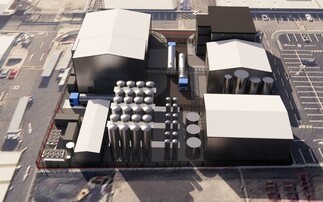My speech to the Stronger Stories Clean and Cool Summit - in full
"A story should have a beginning, a middle and an end - but not necessarily in that order," as the famous Jean-Luc Godard quote has it.
This story starts in the middle, circles back to a beginning that dates to around 300,000 years ago, or perhaps even three to five million years ago, and ends deep in the next century and far beyond.
The protagonists and hopefully the heroes of this story - arguably the most important protagonists in human history - are your good selves.
I want to stress right from the off that this is not hyperbole.
If you accept that the climate crisis presents an unprecedented threat to human civilisation - which you should, because it does - then it also stands to reason that those working to avert that crisis are epic heroes without precedent.
That is you and your colleagues and peers around the world.
No pressure then.
To explain this hypothesis, this story, we need to start in the middle - which is this unique moment in human history.
The other day I was interviewing the CEO of OVO Energy, Stephen Fitzpatrick, who some of you may know. He has been described in the media as "charmingly combative", which is both accurate and which I suspect he rather enjoys.
Anyway, there was a charmingly combative moment when I was gently taken to task for not being optimistic enough.
I was asking a question about how critical the next decade is to whether or not we can avoid a runaway climate change and all that entails, when Stephen interrupted to ask "it's exciting, isn't it?"
I was a bit taken aback, because I do think it is exciting, but I also find it absolutely terrifying.
"No," he insisted, "it's exciting."
Now to understand why it is so exciting we need to loop back to the beginning of the story.
As Stephen explained, the first evidence of early humans using fire date back to around 300,000 years ago - although there is debate that proto-humans could have been using fire over a million years ago.
Either way, that means this generation is the first in the entire sweep of human history that needs to work out how to generate and harness energy without burning stuff.
That is our historic mission. It is up there with our leaving the trees, our harnessing fire, our husbanding of animals and our planting of crops, and our discovery of fossil fuels, in terms of its civilizational import.
No generation has done it before and we have no choice but to become the first.
Why is this mission non-negotiable?
To explain that we need to go even further back to the real beginning of the story, to a point between three and five million years ago.
Because that is when scientists reckon the world endured an atmosphere with greenhouse gas emission concentrations as high as they are currently.
At that point sea levels were 50 foot higher than they are currently and verdant forests grew in the Arctic.
We don't know what the future will hold when civilisation is shoved sharply outside the only temperature zone humanity has ever experienced.
But the best guesses are that either:
- it is fractionally better than expected, which is still pretty bad.
- it is hugely damaging to societies and economies all around the world.
- Or, and this is a small but growing risk, it is absolutely cataclysmic.
Like I said, it is exciting, but it is also terrifying.
This unbending scientific reality explains why this story is needed right now.
But what makes this the right place?
The answer is an accident of history, geography, and economics.
For various reasons - a concentration of coal seams, a relatively small island nation, a temperate climate, a maritime and martial history - the UK was the first nation to industrialise and the first global superpower.
That led to both considerable wealth, a remarkable concentration of engineering brilliance - that continues to this day - and an historic responsibility for an enormous carbon footprint and various associated injustices that came with it.
Now the world needs a second industrial revolution - the first industrial revolution that can be delivered without burning stuff.
The same accidents of geography and history that made the UK the primary crucible for the first industrial revolution should make it a critical hub for the green industrial revolution.
We have:
- High levels of technical and academic skills.
- A stable democracy - or we did until Brexit.
- One of the world's primary financial centres.
- Abundant renewable energy resources.
- International ties to Europe, the Commonwealth, and the US - again, we did until Brexit.
- And a compact, relatively small, and urbanised population.
Some people argue, 'what can the UK do to tackle a global climate crisis when it is responsible for around one per cent of global emissions'?
But another way of framing the same question is 'if not here, where'?
If we can't decarbonise in a relatively small, wealthy country, with many of the characteristics required to build a net zero emission economy, then we won't be able to do it anywhere.
If we - and other nations like the UK - can't provide the template, then no one will follow.
That explains why this is the right time, right place for this story from an historic perspective, but there are nearer term reasons why this is the right time and right place. Some of them are outside protesting in Trafalgar Square right now.
In the past two years something truly remarkable has happened. After two decades of the green economy edging its way towards the mainstream it has finally captured the zeitgeist.
Five inter-related trends have driven this phenomenon and created conditions for the green economy that have never been more attractive.
- Firstly, the economics have shifted. The technologies have matured. We may not yet know how to decarbonise everything, but in key fields we now know that cost effective options exist. The net zero transition looks feasible in a way it frankly didn't 10 years ago.
- Second, we have over a decade of policy trial and error that has established which approaches work. We know standards work. We know carbon pricing works. We know competitive auctions work.
- Third, the public wants action. Whether it is protestors on the streets or the wider public signalling that the environment is a top priority, the voter pressure and market demand is there.
- Fourth, politicians have reacted. Those first three trends have all given the politicians the license and the space to back the net zero transition. As a result the UK now has one of the world's first legal net zero targets and an ambitious, if still flawed, policy environment for delivering it.
- And fifth - and this is a critical and underappreciated point - the climate impacts we are now experiencing are so obvious, so visceral, that they are outrunning the shifting baseline syndrome that previously made it hard for one generation to notice that we had a problem. Or to put it more bluntly, it is so fucking hot.
The combination of these long and short term trends - the sweep of hundreds of thousands of years of human history and the remarkable advance of the green economy and green politics in the past decade - makes this the right time and the right place.
But what is the story?
The right story will vary from person to person and business to business.
But for me - at its root - it is the oldest, most fundamental story there is. It is the first story we are taught as children. The story that comes before the war stories and love stories that dominate adulthood.
It is the story of Noah's Ark, of Hercules, of George and the Dragon, of Fireman Sam and Rescuebots - that last one I am having to watch a lot of at the moment.
It is the story of the brave hero who saves themselves and their community. Of danger and salvation.
The story of progress and the story of the Enlightenment.
Because - and again, this is not hyperbole - if you are working to tackle climate change and build a greener economy you are part of a genuinely heroic movement that is straining every sinew to avert a crisis unprecedented in human history.
You may not like thinking in those terms. It may not always be politic to talk in those terms, but it is true.
This is the story you should tell yourselves, and perhaps even your customers and stakeholders. To borrow the Extinction Rebellion rallying cry: tell the truth.
That said, there is a sting in the tail of this story. Because it is not finished. We are only, to quote Winston Churchill, at the end of the beginning. We are now at the point where this story turns into a choose your own adventure.
One path points to runaway climate change in the coming decades. To mass migration and insecurity. To food shortages and flooding. To economic contraction and political division. Yes, this is the worst case scenario, but it is a non-negligible risk.
The other points to the world you are striving to build.
A cleaner, safer, healthier, more prosperous, more secure, net zero economy.
An economy driven by clean energy and underpinned by the first energy system not reliant on burning stuff.
An economy shaped by optimised, efficient, seamless infrastructure, embedded in connected communities and warm and comfy homes.
An economy that is not just cleaner but better, and in which averting climate catastrophe is just one of many benefits.
That is the story that we are all trying to tell. That is the ending that motivates us to get up in the morning, even as emissions spiral upwards and our political response collapses in on itself under the weight of displacement activities.
My favourite write on climate change, the brilliant US climate scientist Kate Marvel, once argued that we don't need climate hope or climate fear, we need climate courage. "Courage is the resolve to do well without the assurance of a happy ending," she writes.
There is no happy ending guaranteed for this story, but as the entrepreneurs who will help determine its outcome you should be saluted for your courage.
A version of this article originally appeared in the BusinessGreen Overnight Briefing email, which is available to all BusinessGreen subscribers.
Want to find out more about the latest clean technologies? Join us at the BusinessGreen Technology Festival on December 5th as cutting edge clean tech developers, top green investors, and major corporates come together to explore how to accelerate the development and deployment of critical green technologies.










